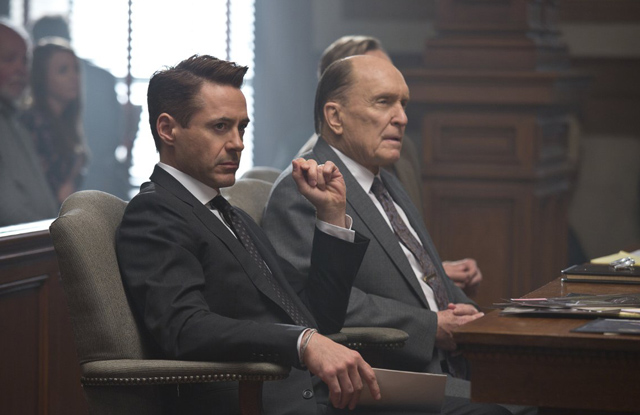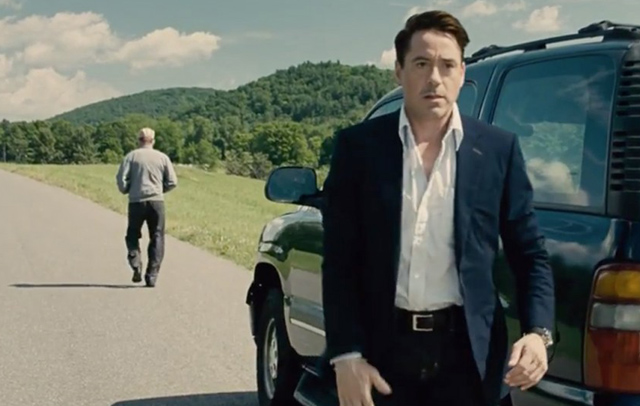CHICAGO – In anticipation of the scariest week of the year, HollywoodChicago.com launches its 2024 Movie Gifts series, which will suggest DVDs and collections for holiday giving.
Inauthentic ‘The Judge’ Guilty of a Stale Confrontation
 Rating: 2.0/5.0 |
CHICAGO – Here comes “The Judge,” here comes “The Judge.” That 1960s catchphrase gets new meaning in the film featuring Robert Downey Jr. and veteran Robert Duvall, in a angry generational face-off that makes little sense and provides a stiff courtroom drama that felt like bad TV.
This is supposed to be a platform for two great film actors, Downey and Duvall, to troll for Oscar nominations in a familiar Daddy-doesn’t-love-me-because-he’s-an-angry-guy story. There is nothing authentic about the reasons regarding their disdain for each other, except the type of misunderstandings that could have cleared up with one phone call. The centerpiece courtroom sequence, in which Lawyer Downey must defend Judge Duvall, is the height of fall-into-place narrative convenience, and should never have gone to trial – but the prosecutor character played by Billy Bob Thornton (naturally) has it in for the arrogant Downey. It all concludes with a tacked-on hackneyed ending, with symbolic syrupy strings and hosannas.
Hank Palmer (Downey Jr.) is a slick Chicago lawyer, whose specialty is defending guilty people, and making them legally innocent. He gets a call that his mother has passed away, and travels to his small Indiana hometown to attend her funeral. There is tension there, as his father Joseph (Duvall) – the tough but beloved local judge – hasn’t forgiven Hank for a past transgression.

The Defender: Hank (Robert Downey Jr.) and Joseph (Robert Duvall) in ‘The Judge’
Photo credit: Warner Bros.
After several clashes involving the father and son during the mourning period, and run-ins with brothers Glen (Vincent D’Onofrio) and developmentally disabled Dale (Jeremy Strong), a mysterious dent in their father’s car causes alarm. The Judge doesn’t remember hitting anyone with the vehicle, but the evidence is clear. Hank will take the case, and at the same time woo a local ex-lover named Samantha (Vera Farmiga).
The establishment of Downey Jr.’s character is teeth-gratingly annoying, as he actually pees on a rival, and then expresses his credentials by bragging about his upper middle class materialism, including a wife that apparently has high school gymnast’s hindquarters (although in the next scene oddly, it’s indicated that he’s getting a divorce from her). It’s downhill from there, as Hank blows with the wind, performing whatever emotional roundabout the inconsistent screenplay from Nick Schenk and Bill Dubuque requires of him.
Duvall gets a bit more forgiveness, just because of his long career, but the angry and curmudgeonly judge character is reminiscent of the far superior “The Great Santini” (or, as he is now, “The Great Old-tini”). He’s angry at his son for a no-sense reason, something that time could easily take care of, and isn’t Hank a hot shot rich lawyer? And wasn’t Hank – as he weirdly reminds the judge during a yell session – number one in his law class at Northwestern?
The supporting characters aren’t much better. The developmentally disabled son is used as comic relief, as he uses a thirty-year-out-of-date home movie camera to capture everyone, which provides for a confrontation over the home movie projector, that not one family in America still uses. D’Onofrio is a better actor than his character is written, and Farmiga is wasted as the girlfriend waiting for Downey to come home. Thornton is there to laugh at when we realize that yes, it is him, and adds little promise thereafter.

Crossroads: Familiar Scene for Hank and ‘The Judge’
Photo credit: Warner Bros.
The dead mother is strangely out of the picture very quickly, as Hank or any of the other family members don’t really mourn her, including the Judge. Hank’s daughter also makes an appearance, and Hank convinces her that the Judge is a monster, but guess what? Yep, they get along famously. And by the way, the doctor treating the Judge – per his patient’s orders – could be liable for malpractice lawsuit, Hank might want to look into that one.
The film is a lost opportunity in a couple key ways. One for the wasted dream team pairing of Downey Jr. and Duvall, and two, because it goes for the feel-good rather than truth of such a dilemma. It would have been much more interesting to understand why Hank and the Judge don’t get along, the roots of it, rather than those dramatic yelling matches and a predictable endgame.
 | By PATRICK McDONALD |


